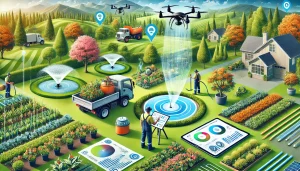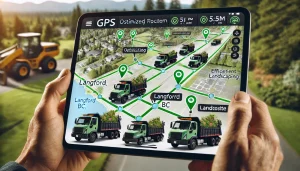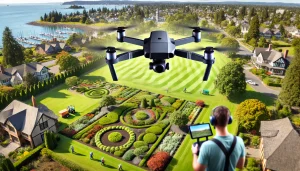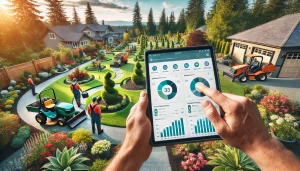
The Role of Technology in Landscape Maintenance
Technology has transformed various industries, and landscape maintenance is no exception. Specifically, by integrating smart technology into their operations, businesses can optimize scheduling, resource allocation, and overall workflow. As a result, this integration not only saves time but also reduces costs and improves the quality of care provided to landscapes.

Key Technologies for Seasonal Maintenance
Automated Irrigation Systems
One of the most significant challenges for landscapers is ensuring that plants receive the right amount of water. Fortunately, automated irrigation systems, equipped with moisture sensors and weather data integration, allow businesses to water landscapes efficiently and effectively. For instance, a local landscaping company in Victoria can install systems that adjust watering schedules based on real-time weather conditions, ensuring that landscapes receive adequate hydration without overwatering.
GPS Tracking for Fleet Management
Managing a fleet of vehicles is crucial for any landscaping business. Therefore, GPS tracking systems enable businesses to monitor their vehicles’ locations, optimize routes, and reduce fuel consumption. For example, a Langford-based landscaping company can utilize GPS tracking to dispatch crews to job sites more efficiently, minimizing travel time and maximizing productivity.
Drone Technology for Site Assessments
Drones have revolutionized how landscape assessments are conducted. By using this technology, businesses can quickly gather data about large properties, assess plant health, and identify areas requiring attention. Consequently, a landscaping firm in Victoria can use drone technology to create detailed aerial maps, making it easier to plan seasonal maintenance tasks and allocate resources accordingly.
Landscape Management Software
Effective scheduling and resource management are critical for successful seasonal maintenance. In particular, landscape management software allows businesses to streamline operations, manage client relationships, and track project progress. In this way, companies in Langford can use this software to schedule maintenance tasks, assign crew members, and monitor equipment usage, ensuring that no time or resources are wasted.

Benefits of Integrating Technology
The integration of smart technology in seasonal maintenance offers numerous benefits for businesses:
- Increased Efficiency: By automating routine tasks and optimizing resource allocation, businesses can operate more efficiently, allowing them to take on more clients and complete projects faster.
- Cost Savings: Reducing waste, optimizing routes, and improving equipment usage can lead to significant cost savings for landscape maintenance companies.
- Enhanced Client Satisfaction: With improved scheduling and resource management, businesses can deliver more consistent and high-quality service, leading to happier clients and increased referrals.

Challenges to Consider
While the benefits of integrating technology are clear, businesses may face challenges in implementation. To begin with, initial costs for equipment and software can be substantial, and staff may have a learning curve to adapt to new systems. Moreover, maintaining technology requires ongoing investment in training and updates.
